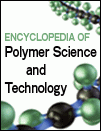Abstract
Alkyd resins of several types are used in coatings. Oxidizing alcohols prepared using semidrying or drying oils are used in architectural gloss paints. Waterborne alkyds are best used by emulsifying oxidizing alkyds. Styrenated alkyds are used particularly in fast drying primers. Nonoxidizing alkyds are used as nonvolatile plasticizers and in baking finishes with melamine-formaldehyde or polyisocyanate crosslinkers. Uralkyds are made by using an isocyanate to replace the phthalic acid used in alkyds. They are more expensive but have superior abrasion and hydrolytic resistance. Stable waterborne oxidizing urethanes have superior stability and abrasion resistance as compared to alkyds. Similarly, epoxy resins are prepared by esterifying with drying oil fatty acids. They exhibit excellent adhesion and saponification resistance and are used in primers. Waterborne epoxy esters are made by reacting with maleic anhydride and are stale to hydrolysis.
Bibliography
- 1 J. H. Hartshorn, J. Coat. Technol. 54, 53 (1982).
- 2 W. J. Muizebelt and co-workers, J. Coat. Technol. 70, 83 (1998).
- 3 N. A. R. Falla , J. Coat. Technol. 64, 55 (1992).
- 4 E. N. Frankel, Prog. Lipid Res. 19, 1 (1980).
- 5 R. A. Hancock, N. J. Leeves, and P. F. Nicks, Prog. Org. Coat. 17, 337 (1989).
- 6 T. L. T. Robey and S. M. Rybicka, Paper No. 217, Paint Res. Station Tech. Pap. 13(1), 2 (1962).
- 7 R. J. Blackinton, J. Paint Technol. 39, 606 (1967).
- 8 T. A. Misev, Prog. Org. Coat. 21, 79 (1992).
- 9 D. R. Porreau and S. E. Smyth, JCT Coatings Tech 1(2), 40 (2004).
- 10 S. L. Kangas and F. N. Jones, J. Coat. Technol. 59, 89 (1987).
- 11 R. Bacaloglu and co-workers, Angew. Makromol. Chem. 164, 1 (1988).
- 12 R. Brown, H. Ashjian, and W. Levine, Off. Digest 33, 539 (1961).
- 13 Tech. Bull. No. 524-5, Velsicol Chemical Corp., Chicago, Ill.
- 14 D. Ryer, Paint Coat. Ind. 14(1), 76 (1998).
- 15 R. W. Hein, J. Coat. Technol. 71, 21 (1999).
- 16 J. Mallegol, J. Lemaire, and J.-L. Gardette, Prog. Org. Coat. 39, 107 (2000).
- 17 S. L. Kangas and F. N. Jones, J. Coat. Technol. 59, 99 (1987).
- 18U.S. Pat. 2577770 (1951), P. Kass and Z. W. Wicks Jr. (to Interchemical Corp.).
- 19 K. H. Zabel and co-workers, Prog. Org. Coat. 35, 255 (1999).
- 20 W. J. Muizebelt and co-workers, Prog. Org. Coat. 40, 121 (2000).
- 21 E. Levine, in Proceedings of the Water-Borne Higher-Solids Coating Symposium, New Orleans, La., 1977, p. 155.
- 22 D. B. Larson and W. D. Emmons, J. Coat. Technol. 55, 49 (1983).
- 23 Technical Bulletin, Resimene AM-300 and AM-325, Monsanto Chemical Co. (now Solutia, Inc.), St. Louis, Mo. (Jan. 1986).
- 24U.S. Pat. 4293461 (1981), W. F. Strazik, J. O. Santer, and J. R. LeBlanc (to Monsanto Chemical Co. (now Solutia, Inc.)).
- 25U.S. Pat. 6075088 (2000), J. Braeken. (to Fina Research, S.A.).
- 26 G. Osterberg and co-workers, Prog. Org. Coat. 24, 281 (1994); G. Ostberg and B. Bergenstahl, J. Coat. Technol. 68, 39 (1996).
- 27 A. Hofland, in J. E. Glass, ed., Technology for Waterborne Coatings, American Chemical Society, Washington, DC, 1997, p. 183.
- 28 P. K. Weissenborn and A. Motiejauskaite, Prog. Org. Coat. 40, 253 (2000).
- 29 T. Nabuurs, R. A. Baijards, and A. L. Germna, Prog. Org. Coat. 27, 163 (1996).
- 30 J. W. Gooch, S. T. Wang, F. J. Schork, and G. W. Poehlein, in Proceedings of the Waterborne, High Solids, Powder Coating Symposium, New Orleans, La., 1997, p. 366.
- 31 W. S. Sisson and R. J. Shah, in Proceedings of the Waterborne, High Solids, Powder Coatings Symposium, New Orleans, La., 2001, pp. 329–336.
- 32 C. J. Bouboulis, in Proceedings of the Water-Borne Higher-Solids Coatings Symposium, New Orleans, La., 1982, p. 18.
- 33 B. Zuchert and H. Biemann, Farg och Lack Scand. 9(2) (1993); W. Weger, Fitture e Vernici B 66(9), 25 (1990).
- 34U.S. Pat. 5004779 (1991), H. Blum and co-workers (to Bayer Aktiengesellschaft).
- 35U.S. Pat. 6187384 (2001), G. Wilke, D. Grapatin, and H.-P. Rink (to BASF Coatings AG).
- 36 R. Hurley and F. Buona, J. Coat. Technol. 54, 55 (1982).
- 37 P. J. Bakker and co-workers, in Proceedings of the Water-Borne High-Solids, Powder Coating Symposium, New Orleans, La., 2001, pp. 439–453.
- 38 J. Kaska and F. Lesek, Prog. Org. Coat. 19, 283 (1991).
- 39 Anonymous, The Chemistry and Processing of Alkyd Resins, Monsanto Chemical Co. (now Solutia, Inc.), St. Louis, Mo., 1962.
- 40 J. Kumanotani, H. Hironori, and H. Masuda, Adv. Org. Coat. Sci. Technol. Ser. 6, 35 (1984).
- 41 W. Liu, S. Wang, and T. Rende, in Western Coating Symposium, Reno, Nev., 1999.
- 42 D. A. Wicks and Z. W Wicks Jr., Prog. Org. Coat., 54, 141 (2005).
- 43 R. Narayan and co-workers, Paint India, Sept. 116 (1998).
- 44U.S. Pat. 6083312 (2000), G. L. Bajc (to BASF Corp.).
- 45U.S. Pat. 6,559,225 (2003). C. Irle and co-workers (to Bayer Chemical).
- 46 U.S. Department of Commerce, Bureau of Census, Current Industrial Reports—Paint and Coating Manufacturing, available at http://www.census.gov.
- 47U.S. Pat. 6011085 (2000), B. A. Maxwell and co-workers (to Eastman Chemical Co.).
- 48U.S. Pat. 6083312 (2000), G. L. Bajc (to BASF Corp.).
- 49 Skeist Report VI, Skeist Inc., Whippany, N.J., 1998, pp. 805–826.



